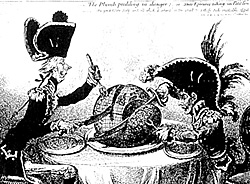 Historians continue to debate the causes of the nonstop conflict in Europe from 1792 to 1815. Was it merely a continuation of the long rivalry between France and Great Britain that began hundreds of years before in the claims of kings over sovereignty? Was Napoleon simply reacting to wars started by the established monarchs of Europe who saw France as a destabilizing force in the previous balance of power and interests? Perhaps they simply could not accept Napoleon as an equal. Or was Napoleon's relentless ambition the driving force behind the constant warfare?
Historians continue to debate the causes of the nonstop conflict in Europe from 1792 to 1815. Was it merely a continuation of the long rivalry between France and Great Britain that began hundreds of years before in the claims of kings over sovereignty? Was Napoleon simply reacting to wars started by the established monarchs of Europe who saw France as a destabilizing force in the previous balance of power and interests? Perhaps they simply could not accept Napoleon as an equal. Or was Napoleon's relentless ambition the driving force behind the constant warfare?
The Napoleonic Wars which began in 1803 with Britain's declaration of war against France, lasted until 1815. Many believe that it was Napoleon's insatiable ambition and megalomania that caused Britain to declare war and precipitated the other wars with the continental powers.
This explanation is too simplistic because it disregards the context. All of the European powers were imperialistic and sought expansion as an end in itself. France, which started the Wars of the Revolution in 1792, sought warfare for internal domestic reasons, while Austria and Prussia wanted to reduce France to the status of a dependent power. With the advent of the Jacobins, the war took on an ideological component.
France declared war on Britain in 1793. The objective of the French Republic was its "natural" frontiers, which included the Rhine River and Belgium. Great Britain was the only European state to specifically declare its war aims, which were France's frontiers of 1792, the creation of buffer states along France's frontier, and the restoration of the Bourbon monarchy.
France won the Wars of the French Revolution, which saw the rise of Napoleon Bonaparte. France made peace on the continent in 1801 and with Britain in 1802. The Amiens treaty left France the most powerful state in Europe. The peace was not well accepted within Britain, which, according to Harold Deutsch in his Genesis of Napoleonic Imperialism, "was straining every principle of British policy."
Both France and Britain recognized this period of peace as a truce and a breathing space for the next round. The Anglo-French War became the fulcrum around which all other diplomacy and the wars revolved. While Napoleon prepared to invade Britain in 1805, Austria and Russia, both seeking their own imperial interests, joined Britain against France. Napoleon was forced to turn against them, winning at Ulm and Austerlitz, while Britain gained control of the seas, winning at Trafalgar.
Despite Napoleon's spectacular victories, the struggle between the British leviathan and the French behemoth continued. Each side could only attack the other indirectly via its own medium of land or sea. Britain attacked neutral ships, destroyed the Danish fleet in 1807, and caused a war with the United States in 1812. Napoleon, unable to invade Britain, returned to a policy of the Directory from the 1790s: a European boycott of British goods that would hurt Britain economically, forcing her to come to terms. By 1806, this became known as the Continental System. To work, all of Europe had to join in, willingly or not.
Some historians claim that Napoleon's Continental System was but an excuse for expansion, citing his usurpation of the Spanish throne in 1808. Meanwhile, whenever France showed weakness, someone attacked, as Austria did in 1809. In 1810, Russia, a French ally since 1807, deserted the Continental System. Both Tsar Alexander and Napoleon recognized that this would lead to war.
Napoleon's war aims for his invasion of Russia in 1812 were vague. At a minimum, it was a limited war to bring Russia back into the Continental System. The Russian campaign failed so badly that Prussia and Austria joined Russia and Britain against France in 1813. By 1814 all of the Allies accepted British war aims of the French frontiers of 1792 and the restoration of the Bourbon monarchy.
There is no "smoking gun" to prove or disprove that Napoleonic imperialism was any more than that of the other major powers and that Napoleon bears sole responsibility for the wars. The final settlement at Vienna in 1815 showed not only the triumph of British war aims, but those of the other states as well. Prussia was greatly expanded beyond the frontiers of 1806, Russia gained control of Poland, and Austria effectively controlled most of Italy.
Back to Table of Contents -- Napoleon #17
Back to Napoleon List of Issues
Back to MagWeb Master Magazine List
© Copyright 2001 by Napoleon LLC.
This article appears in MagWeb (Magazine Web) on the Internet World Wide Web.
The full text and graphics from other military history magazines and gaming magazines are available at http://www.magweb.com
Order Napoleon magazine direct